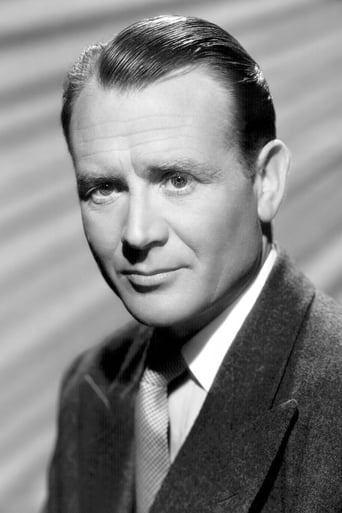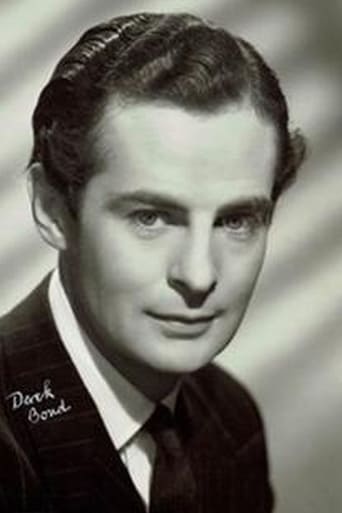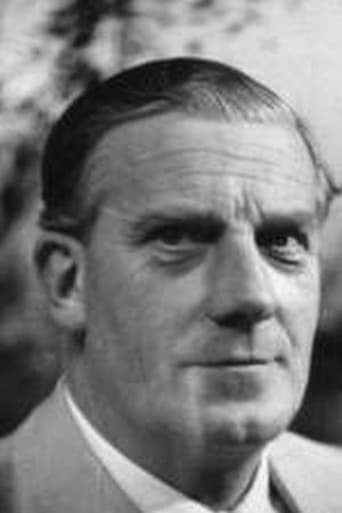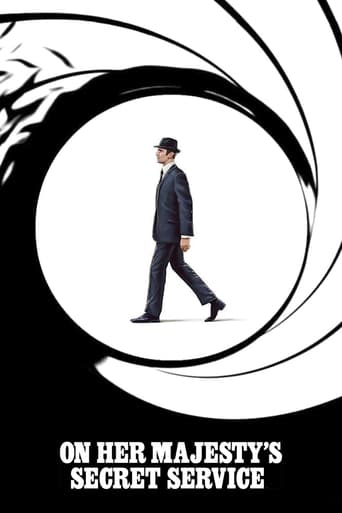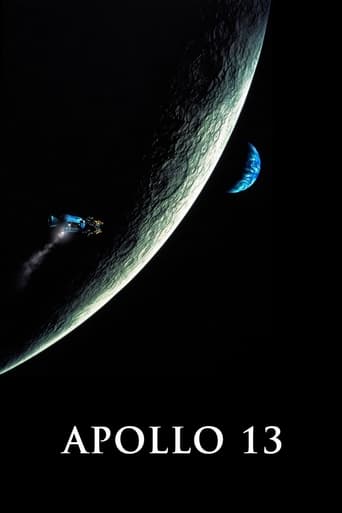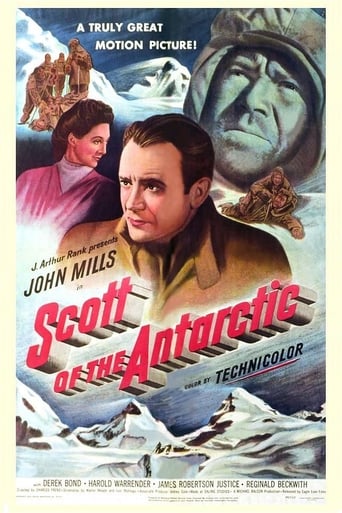
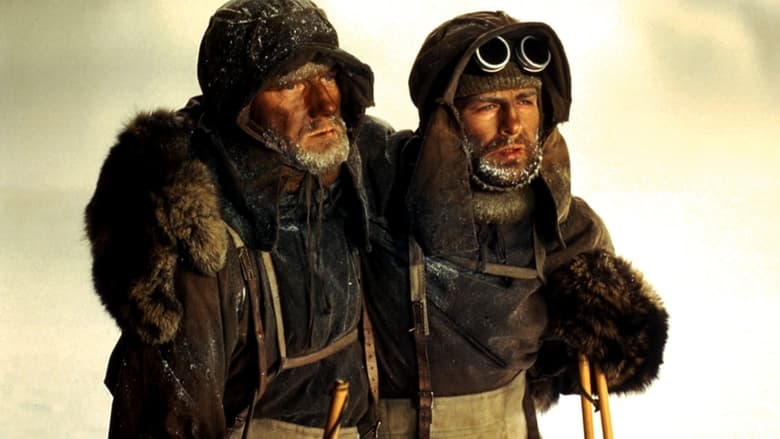
Scott of the Antarctic (1949)
The true story of the British explorer Robert Falcon Scott and his ill-fated expedition to try to be the first man to discover the South Pole - only to find that the murderously cold weather and a rival team of Norwegian explorers conspire against him
Watch Trailer
Cast


Similar titles
Reviews
Truly Dreadful Film
Simply Perfect
This movie was so-so. It had it's moments, but wasn't the greatest.
A terrific literary drama and character piece that shows how the process of creating art can be seen differently by those doing it and those looking at it from the outside.
Produced by Ealing Studios, Scott of the Antarctic is a stiff upper- lipped depiction of Captain Scott's infamous, ill-fated expedition to the South Pole. Facing freezing storms, starvation, lack of fuel, and having just digested the sobering revelation that Norwegian rival Roald Amundsen had beaten them too it, Scott and his remaining team of four settled and died just 11 miles from camp, where food, warmth and undoubtedly survival awaited them. Trading very much on the legend of Captain Scott, the film charms thanks to it's post-WWII optimism and gorgeous colour cinematography.Beginning with a determined Scott, played heartily by John Mills, rounding up his crew, the film takes it's time to get to the Arctic. Relying on Captain Scott's beautifully written diary for its source of information, the film feels more documentary than straight feature. It is all the more detailed and authentic for it, but it comes at the expense of any real character development. By the time the credits roll, we know little more about Scott than when we started, apart from that he was obviously a determined and courageous man. But it makes up for this neglect with a startling final third, where director Charles Frend puts us through every step of Scott's exhausting final thrust to get back to civilisation.Mills and the supporting cast (James Robertson Justice, Kenneth More, Harold Warrender et al) are excellent throughout, starting out as eager and boisterous, and later, as the last survivors wait to die in the tent that would become their tomb, withdrawn and contemplative. The setting plays as the main villain, and it's captured as both a place of isolated beauty and uninhabitable terror , thanks to Jack Cardiff's stunning cinematography, and it's the encroaching sense of doom that gives Scott of the Antarctic a raw power. Although it obviously ends badly, Scott's death proved to be the making of him. Amundsen was (somewhat cruelly) dismissed as a bad sportsman, and Scott was instantly labelled a hero for daring to stare such overwhelming odds in the face and hold his head high. For a country still recovering from the ravishes of war at the time of the film's release, it must have been a powerful sentiment indeed. One of Ealing's most overlooked efforts.www.the-wrath-of-blog.blogspot.com
This is the story of English explorer Robert Scott's 1912 expedition to the South Pole, perfectly portrayed by British actors, who are without a doubt, the finest actors in the world.John Mills is excellent as Captain Scott in a faithful performance which mirrors Scott's unassuming nature and sincere kindness. A fine supporting cast includes Reginald Beckwith as fellow explorer Bowers and Diana Churchill as Captain Scott's wife, Kathleen.The real-life final letters written by the party at the end of their mission are respectfully and touchingly presented capturing not only the tragedy of the moment, but also the bravery, honor, and adventuresome spirit of these great men.Majestically photographed in color in 1948. A truly beautiful film.
Whilst more recent documentaries might be more accurate and better told, technically, this just-after-the-war Technicolor British 'Pride' docu- drama is both stirring and patriotic.With one of the best cinematographers that ever lived behind the camera, the great, late Jack Cardiff, the snowy wastes (actually filmed in Norway) are a far cry from the cheeky, monochromatic East End comedies of other Ealing's.The much-loved John Mills plays and narrates as Captain Scott, whilst there's rousing support from the familiar faces of Kenneth Moore, John Gregson and James Robertson Justice. The stiff upper lip is never far away as bravely, first Scott rallies for funds to pay for the trip and then undertaking it.There's humour, comradeship, sadness and glorious spectacle in this and I'm sure the at-times dastardly and enthusiastic playing was more for cinematic appeal than the original trek must have been. When it was originally shown, the film must have seemed like a breath of fresh air, being so different to what was normally in the cinema. Location shooting being expensive, abroad more so and in such a hostile environment, a real achievement.We all know the outcome but it's the journey getting there and this film, very well made and entertaining to watch, does the memory of Scott and his endeavours, proud.
History and heroism have always made for fertile ground for storytellers. The story of the ill-fated 1910-1912 British arm of the race to the South Pole that was led by Captain Sir Robert Falcon Scott would prove to be no exception to that rule. While history's opinion of Scott and his expedition has tended to shift back and forth and thus can cloud the issue of this film's historical accuracy one thing is certain though. That is that this film, not matter one's thoughts on its historical accuracy, is a fine film armed with a fine cast, strong production values and a fantastic score. The result is a fine film recreation of the tale of Scott and his men.To begin with the film boosts a fine cast of actors. John Mills plays Captain Scott as a heroic figure doing his best to lead his men in one of the harshest places on Earth, an interpretation that (if other reviews are anything to go by) is certainly cause for controversy six decades on but in the film's context works well. If one needs any proof of just how good Mills is listen to him as he reads out entries from Scott's journal throughout the film. There's also a fine supporting cast including Harold Warreneder as Naturalist E.A. Wilson, Derek Bond as Captain Oates, Kenneth More as Lt. "Teddy" Evans, Reginald Beckwith as Lt. "Birdie" Bowers, Clive Morton as famed Antarctic photographer Herbert Ponting and even a young Christopher Lee in the role of Bernard Day. Sadly the only actresses in the film, Diana Churchill as Scott's wife and Anne Firth as Wilson's wife, seem to be far too constrained by the conventions of wive roles of the time. Overall though it is a fine cast.Scott Of the Antarctic also boosts some strong production values as well. The sets of Arne Akermark are some fine recreations of the various elements of the expedition including the Terra Nova ship, Scott's base of operation and the tent interiors along the way to the pole and back. The costumes of Anthony Mendleson are also fantastic recreations of the outfits and uniforms worn by those who took part on the expedition. Then there's the make-up work which helps to bring a sense of the effects of the Antarctic wilderness upon the men of the expedition. There's also some incredible cinematography as well that reaches not only from the sets but to footage of the Antarctic as well. All together they make for a meticulous and incredible recreation of the places and things involved in the expedition.The film is also blessed with a fine score from composer Vaughan Williams. Williams score is an epic and sweeping piece that makes, all by itself, an incredible portrait not only of the expedition but of the icy continent. Of special mention is Williams pieces for the opening credits, Scott's entry from the end of the Discovery expedition, the Terra Nova's arrival in the Antarctic and the music that accompanies the films last few minutes. The quality of the music makes it no surprise that Williams took this score (of which only half the music he composed ended up in the film) and created his seventh symphony from it.Last, but not least, there is the script. If other reviews that I've read are any indication of things it is that the script is the single most controversial aspect of the film. After some six decades, the controversies surrounding Scott's expeditions make it nay impossible to properly judge the film on its historical accuracy. That said there are some definite changes to the historical events (the death of P.O. Evans being a prime example) but these can be forgiven as virtually every film based on a historical event makes changes to the facts to suit its needs . Judging the script from a writing point of view alone, the script is pretty good in terms of most of its dialogue and compressing years worth of events into under two hours of screen time.While the historical accuracy of the script will continue to be debated I'm sure, there are plenty of other fine things to be found in Scott Of The Antarctic. These include the fine cast, the superb production values and the fantastic score of composer Vaughan Williams. If one can say nothing else about this film it is this: that after six decades it remains a good old fashioned film of adventure and courage.


